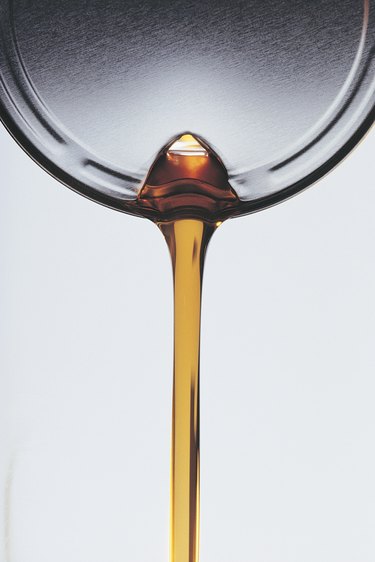Things You'll Need
Cardboard
Oil drip mat
Oil drip pan
Hose
Concrete cleaner
Concrete sealer
Paint tray
3/4-inch nap paint roller
Threaded mop or broom handle

Concrete driveways offer homeowners a strong and durable surface on which to park their cars. Concrete driveways come in a range of styles and colors, ranging from the basic, clean lines of a standard pour to stamped and dyed concrete. However, parked cars that leak oil can leave unsightly stains on the surface of the driveway, ruining the driveway's visual appeal. Protecting the driveway from dripping oil prevents concrete driveway stains. As several driveway protection options are available, you can choose the protection method that best suits your preference.
Step 1
Set a large sheet of cardboard on the driveway to catch oil drips. Park the car over the cardboard with the oil-leaking section positioned over the cardboard or slide the cardboard under the car after you park it and turn off the ignition.
Video of the Day
Step 2
Position a specialized oil drip-catching mat on the driveway. Pull the car into the driveway, stop and park the car over the mat. Situate the car so that the drips fall onto the mat.
Step 3
Place an oil drip pan under the oil-leaking area of the car after you park the car and shut off the ignition. Put the oil drip pan directly under the leaky car part.
Step 4
Clean existing stains in the driveway with a hose. Wet the concrete, treat stains with concrete cleaner and allow the driveway to dry.
Step 5
Seal the concrete to avoid future stains. Pour concrete sealer into a large paint tray and attach a 3/4-inch nap roller to the threaded end of a broom or mop handle. Roll the paint roller through the sealer and roll the sealer onto the concrete. Let the concrete sealer dry for 24 to 48 hours before parking cars on the driveway.
Tip
Fix any oil leaks as soon as possible to prevent oil drips on the concrete.
Warning
Dispose of accumulated oil on the cardboard or in the drip pan according to state and local laws.
Video of the Day